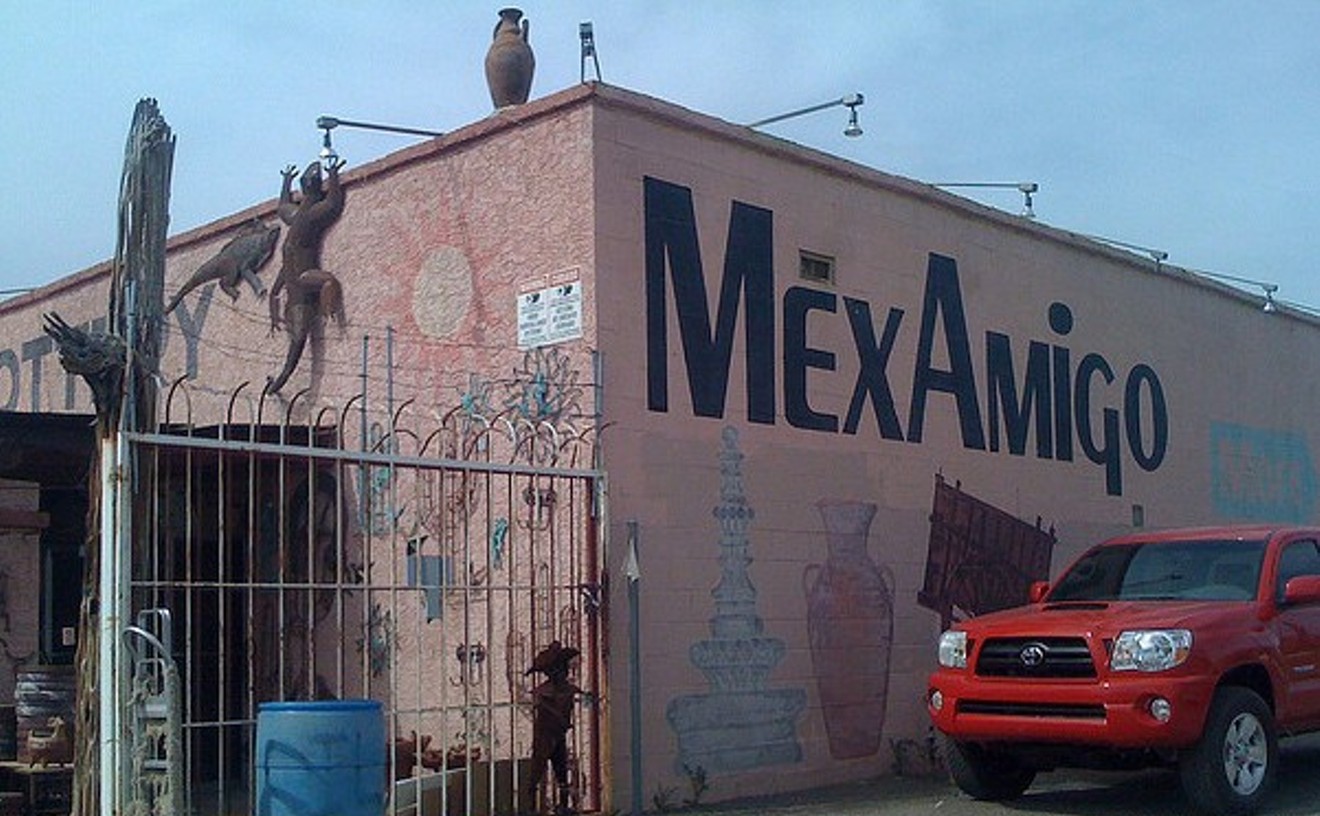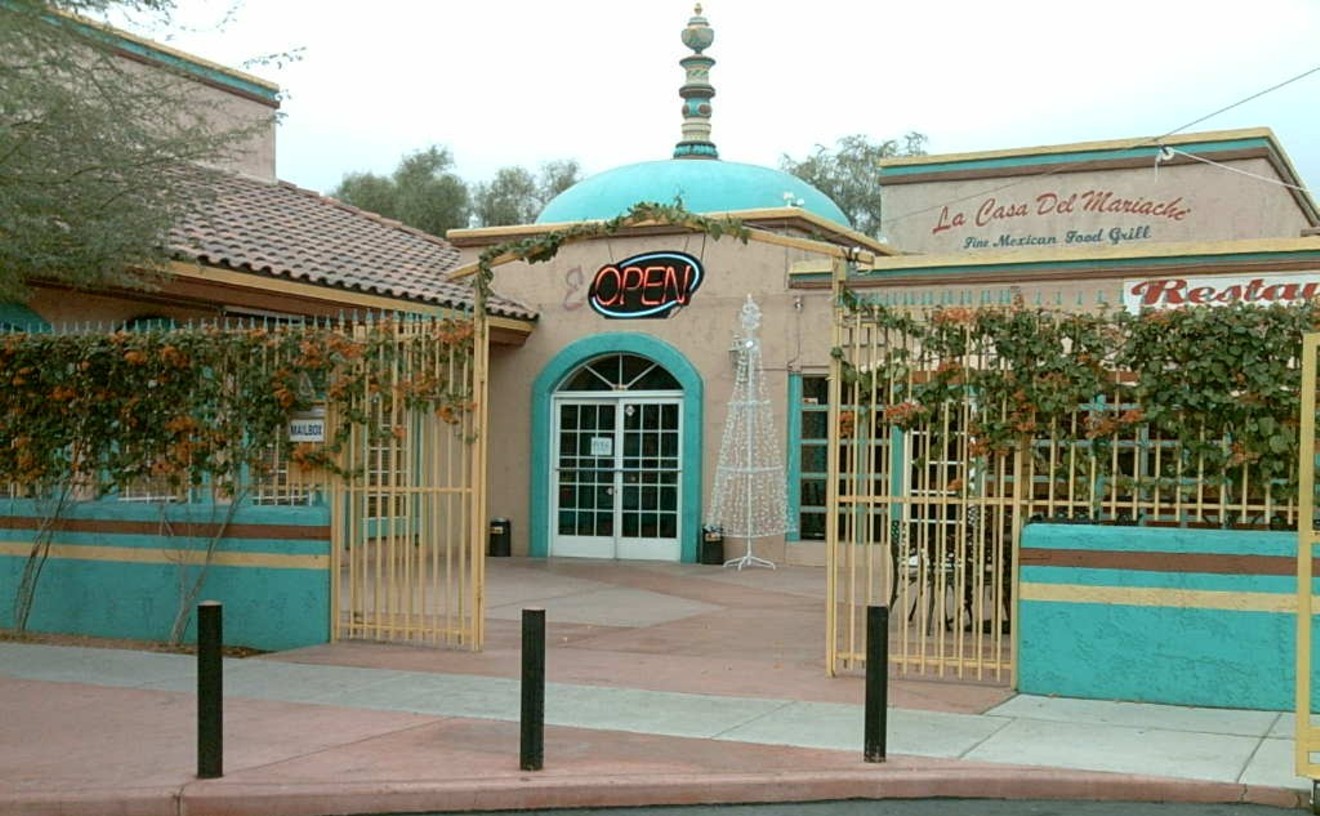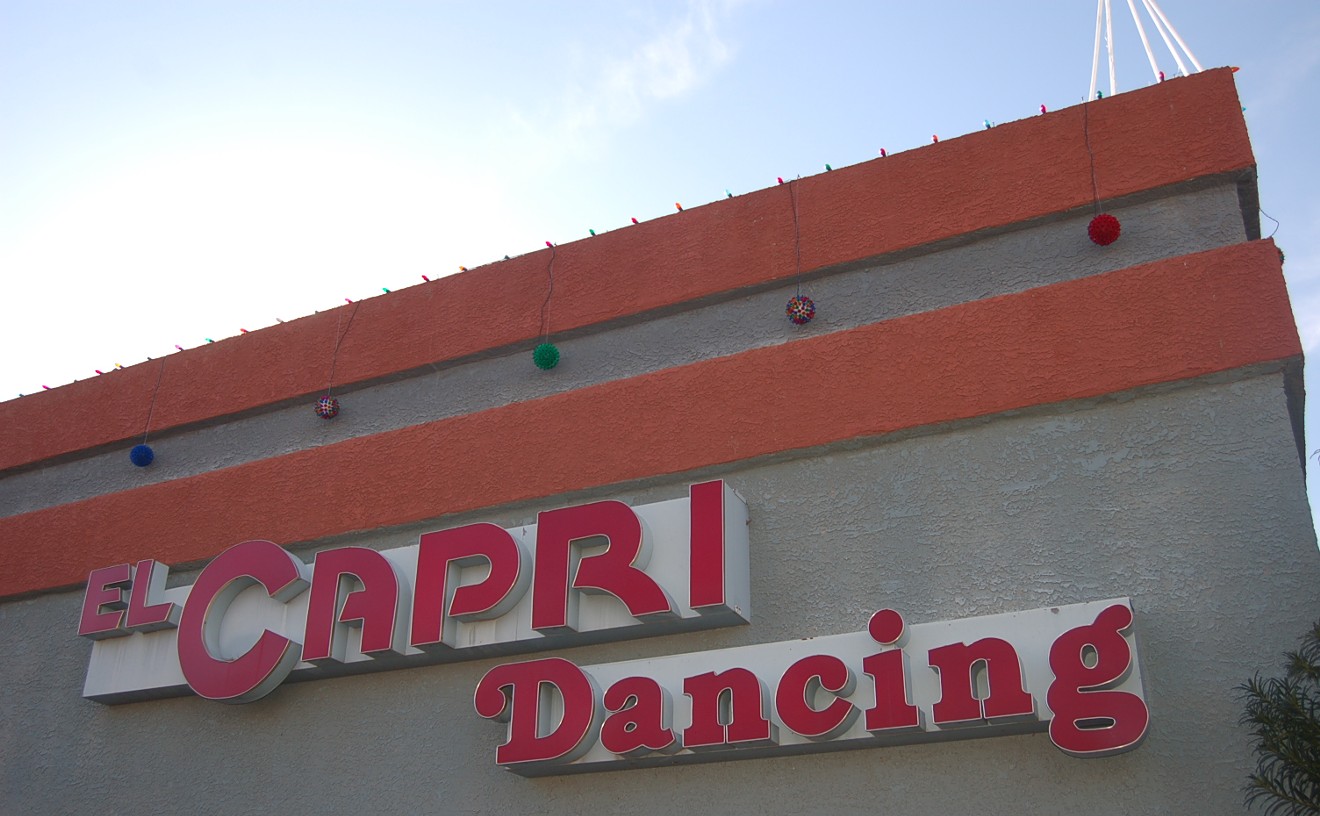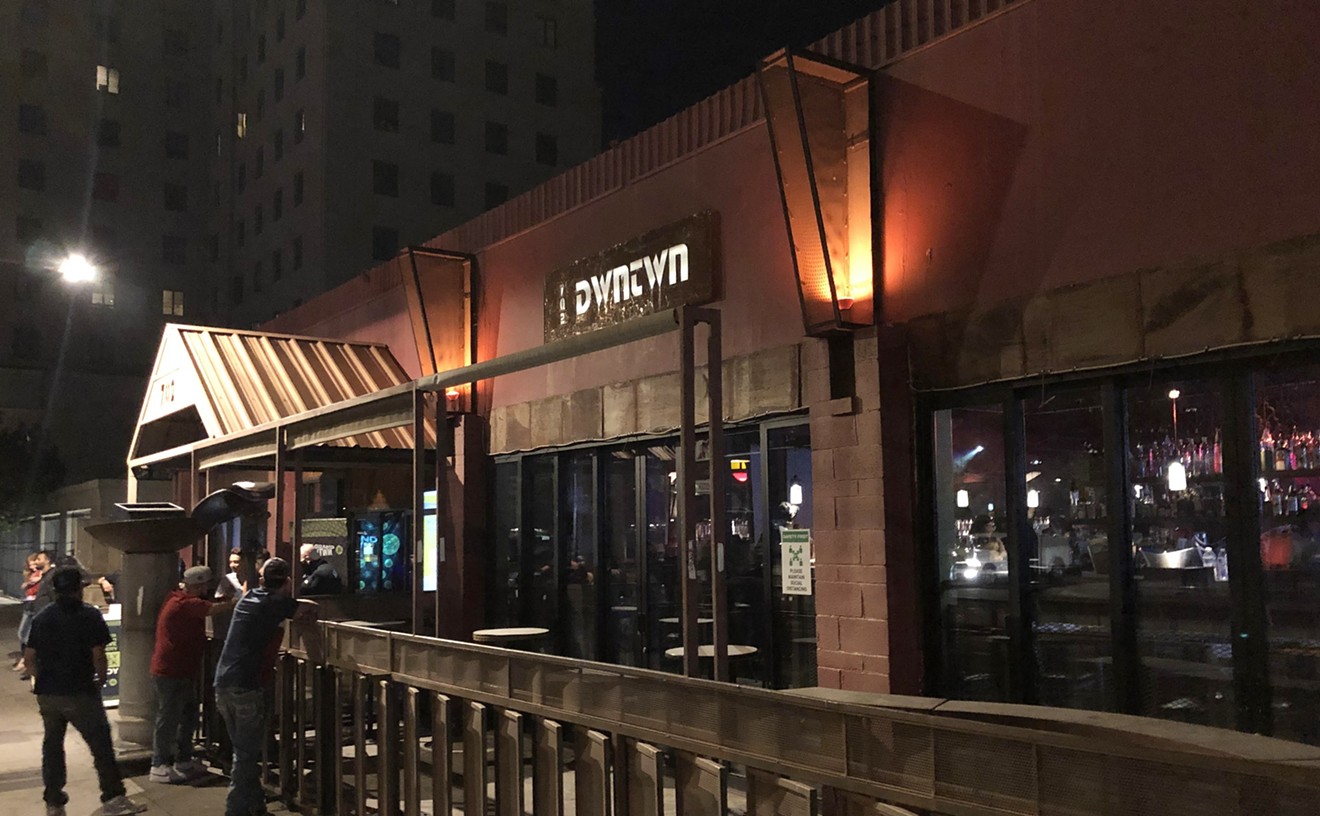BEST MEXICAN TILE
Mexican Tile Company

Sick of Country French (or Arts and Crafts or anything mauve) and want to plunge into more colorful Mexican decor? If that's the case, Mexican Tile Company is where you should start for your casita's extreme makeover. For more than 30 years, this veritable Valley tile institution has been offering real Mexican tile, both decorative and flooring, to picky homeowners and designers. It's now added stone, like Italian travertine and tumbled marble, as well as porcelain stone look-alikes, to its burgeoning stockpile of Mexicanesque decorative building blocks. Besides classic Saltillo tiles in a number of sizes and shapes, we spotted tiles from Dolores Hidalgo, Guanajuato, in an assortment of traditional patterns, including trim pieces in the shape of twisted rope, and San Carlos-style concrete tiles popular back in the '20s and '30s. Delicious high-fired Portuguese and Spanish tiles with 18th-century motifs, just waiting to make a statement in some neglected bathroom, are also available -- and make sure to scope out the store's gorgeous Mexican hand-painted sinks. If you can't find tile in the patterns or colors you need, Mexican Tile Company also works with local artisans who can create custom tiles from scratch just for your decorative do-over.
- 2306 W. Greenway Rd., Phoenix, 85023 Map
- 602-954-6272
- www.mexicantileandstone.com
BEST MEXICAN COLONIAL-INSPIRED FURNITURE
Fiesta Furnishings

"Muy classy!" is all we can say about Fiesta Furnishings, a spacious decor emporium that features furniture and accessories with an elegant Spanish Colonial feel. Owned and operated by Claudia and Ralph Farrar, who were both importers of Mexican folk arts and crafts before they met and married, Fiesta specializes in items you won't see in your run-of-the-mill Mexican furniture stores. The Farrars travel constantly throughout Mexico and other parts of the world to cull beautiful carved wooden doors, mirror frames, candlesticks, and other contemporary architectural elements done in Mexican styles of yesteryear. You'll also see beautifully complementary items such as rustic Italian pots and Moroccan lanterns (because, actually, most of that Spanish Colonial look comes from 14th-century North African Islamic designs and motifs). Add to that mezcla ironwork, lighting, carved cantera stone accessories and lovely Mexican talavera pieces, and you've got instant, unassailable good taste.
- 15320 N. Hayden Rd., Scottsdale, 85260 Map
- 480-951-3239
- www.fiestafurnishings.com
BEST RUSTIC MEXICAN FURNITURE
MexAmigo

Don't know where to find "country Mexican" furniture and accessories for that autentico rancho look? MexAmigo has crammed an entire building with reasonably priced rustic Mexican furniture just waiting to go home to your hacienda. It's right here you'll find table and chair sets of pigskin-and-estaca wood equipales (historically speaking, they're said to date back to pre-Conquest times in Mexico -- even Moctezuma had one of these pigskin chairs), chip-carved bales (chests), trasteros (traditional dish shelves), end tables, and large armoires for hiding your post-Conquest TV. We were especially taken with an all-wood bar emblazoned with the words "cantina" and "cerveza fria." The best part of MexAmigo's stock is that it comes with different finishes ready to roll -- or unfinished and just waiting to be stained, waxed or oiled or, if you're the adventurous artsy type, painted with abandon in wild colors of hot pink, colonial blue, buttery yellow, royal purple, rust red and turquoise.
- 17404 N. Cave Creek Rd., Phoenix, 85032 Map
- 602-404-0742
- www.mexamigofurniture.com
BEST MEXICAN DECORATING ACCESSORIES
Casa del Encanto

We thought we had stumbled into 18th-century Mexico through a rip in some time dimension when we pulled up to Casa del Encanto, which literally means "the enchanting or bewitching house." Built in a classic Spanish colonial U-shaped configuration with rust-colored walls, arched windows and cantera stone trim, Casa del Encanto is a perfect re-creation of an elegant, upscale Mexican residence built several centuries ago. If you can get past the store's lush courtyard adorned with a water-lily-filled fountain and carved stone sculptures (all of which are for sale), huge doors open onto the Casa's display floor, crowned with soaring vaulted and hand-painted ceilings and artfully jammed with high-end colonial-style accessories and furniture. Better plan on winning PowerBall if you hope to do major shopping here, as the prices match the high quality of Casa del Encanto's spectacular inventory. Or heck, why not get out the credit card? Floating through a forest of one-of-a-kind merchandise, we spotted a six-foot-high carved and gilded candlestick that would not look out of place in a cathedral, wooden religious wall sculptures done in estofado, exquisitely decorated talavera pieces, and masterfully executed architectural elements that would make any museum curator do a double take.
- 6939 E. First Ave., Scottsdale, 85251 Map
- 480-970-1355
- www.casadelencanto.net
BEST MEXICAN RADIO STATION
Radio Campesina, KNAT-FM 88.3
The Phoenix branch of Radio Campesina (there are also stations in Parker, Fresno, and Salinas) boasts the hottest Mex-mixes in the Valley, airing tunes by renowned Latin pop artists such as Juan Gabriel and Los Tigres del Norte, as well as pioneers like norteño innovator Marco Antonio Solis and ranchero legend Vicente Fernandez. The latter artist is also a DJ for the station, spinning artists like Sin Bandera, José José, and Cristian Castro during his show from 9 a.m. to noon on Sundays. In addition to the caliente on-air personalities, Campesina also features talk-radio programs geared toward the issues facing immigrant families, the most popular of which is "Punte De Vista" with Carlos Ortiz, airing from 10 to 11 a.m. Monday through Friday. Whether listeners are looking for hot Tejano tunes or want to sound off on politics, Radio Campesina's got 'em covered.
BEST PLACE TO BUY NARCOCORRIDOS
El Idolo de Oro
It seems that if it's Mexican and it even remotely involves music on tape or CD, El Idolo de Oro has it. This tuneful stop stocks just about every regional group living, breathing and harmonizing in Mexico, including oompah bands from Michoacán; norteño/Tex-Mex groups from Sonora, Chihuahua and Sinaloa; the exitos (hits) of wailing mariachi ensembles from Jalisco -- even reggaeton, a salsita of hip-hop, rap and Jamaican reggae from Puerto Rico, and Mexican rap by Control Machete. El Idolo's strong suit, however, is an incredible selection of narcocorrido music, a recent twist on the romantic Mexican folk ballads, or corridos, blaring in every Mexican restaurant and cantina from here to Culiacán. Think of the narcocorrido as the Mexican equivalent of American folk tunes about Western gunslingers, desperadoes and bank robbers (or maybe the theme song from The Sopranos) -- except that these ballads chronicle the joys and derring-do involved in drug trafficking (narcocorrido expert Elijah Wald says, "They're an anachronistic link between the earliest European poetic traditions and the world of crack cocaine and gangsta rap"). Ain't nothing new here, since more than a century ago, the corridos were about crafty Robin Hood types, revolutionary guerrillas like Pancho Villa and campesinos who pulled fast ones on evil Texas Rangers. Wildly popular both south and north of the border, narcocorridos are set to polka or waltz rhythms and usually backed by accordions and often brass sections. El Idolo carries the latest by groups famous for these drug ditties, like Los Tigres del Norte, Los Tucanes de Tijuana, Grupo Exterminador (you gotta love a group that's titled one of its albums Contrabando en los Huevos), Los Pajaritos del Sur, and the notorious Sinaloan legend Chalino Sanchez. With titles like Los Tigres' Pacto de Sangre (Blood Covenant), it makes you wanna run to the nearest Berlitz for a crash course in Spanish so you can figure out all the lyrics.
BEST PLACE TO HEAR LIVE MARIACHI MUSIC
La Casa del Mariachi

The takeout menu for this great place announces in Spanish that it's "the place where you will find good ambiance, good music and good food." And the restaurant's proud claim is no lie, especially on Friday, Saturday and Sunday evenings. On those nights, beginning at about 6:30, mas o menos, La Casa del Mariachi serves up bueno grub (its specialty is authentic Mexican seafood) and a free mini-floor show featuring live singing, often with live mariachi musicos such as Mariachi Tierra del Sol (who performed last May with the Phoenix Symphony at the Dodge Theatre). The night we went, we were regaled by a good-looking norteño cowboy dude in suit and hat who looked a little like a svelte Garth Brooks doing Mexican karaoke. Garthcito ended up doing a singing lap dance for a gaggle of señoritas, and later in the evening, as they so often do, the folks at La Casa broke out with live mariachi music in the spacious Salon Guadalajara. It'll cost you a cover charge to get in, but it's worth it to enjoy the raucous sights and sounds of a real-deal, full-liveried mariachi ensemble -- not to mention the enthusiastic patrons who play and dance until they shut the place down at 2 a.m.
- 1420 N. 24th St., Phoenix, 85008 Map
BEST MEXICAN NIGHTCLUB
El Capri

You might feel a bit intimidated when approaching this popular discoteca, which is situated alongside a freeway overpass. But don't be put off by the parking lot crammed with Cadillac Escalades and Audis, the squad of Phoenix cops gathered outside keeping the peace, or the lengthy line out the front door. Really: Don't let it get to you, cabrón. Just get your ass past security and onto this hot club's expansive dance floor. Shake your culo until the wee hours of the weekend to such musical styles as cumbia, norteño, mariachi and banda, provided by either a DJ or a live band, depending on what night you're there. Expect to get down alongside vatas in tight-fitting dresses, caballeros in crisp new cowboy hats and matching snakeskin boots and belts, or jersey-clad sportos wearing plenty of bling. If refreshment is required, grab a Dos Equis, Negra Modelo, or a shot of Cuervo from the bar before heading back into the crowd to stage a dance revolution. ¿Desea bailar? You will after coming to El Capri.
- 2135 E. Van Buren St., Phoenix, 85034 Map
- 602-244-0551
BEST LATIN DANCE NIGHT
Saturdays at Club Dwntwn

Benjamin Leatherman
You'll find the hottest Latin club in these parts is wedged amongst the high-rises of downtown Phoenix. Without fail, Club Dwntwn draws an enormous crowd -- 1,500 people on a Saturday! -- and in just three years has expanded from two rooms to three. Even then you can barely walk through without bumping into someone. In the main room, DJs Mixxman and Czr3ro energize a crowd of well-dressed partyers with a hybrid of Spanish pop, Top 40, and tribal tunes. Elsewhere, DJs Joey and Ponk spin pure reggaeton, where, in the back room, dancers writhe under a gorgeous chandelier to salsa, merengue, bachata, and cumbia played by DJ Roberto or the occasional live band. This hopping hot spot has even drawn big-name producers and DJs from Mexico like Pelos, Mijangos, Macsi, and Bolillo. And partygoers can keep shaking their cans until the sun comes up, because the music pumps 'til 5 a.m.
- 702 N. Central Ave., Phoenix, 85004 Map
- www.clubdwntwn.com/
BEST GAY LATIN DANCE NIGHT
Karamba

Karamba
Club Karamba steams up its own windows every weekend with Kaliente Saturdays, a party packed wall-to-wall with queer Latin lovers dancing to the beat of DJs Tranz and Melo. The jockeys throw salsa, merengue, cumbia, rock and pop en español into the mix while Latin music videos project onto an enormous screen. It's a sexy backdrop for a high-energy crowd that's there to party 'til 4 a.m. And if you get there before 10 p.m., it's all free, mica!
- 1724 E. McDowell Rd., Phoenix, 85006 Map
- 602-254-0231
- www.karambanightclub.com





